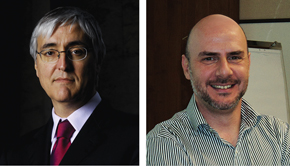
1. Léo Ramos / 2 Johnson & JohnsonMello from Vale and Pelino from Johnson & Johnson: companies can also offer good opportunities to grow and learn1. Léo Ramos / 2 Johnson & Johnson
Switching jobs is almost never a simple decision, especially when money is not the primary factor. When the invitation comes from a private-sector research and development (R&D) company and the invitee is an academic researcher, the uncertainty take on even greater proportions. What questions should a scientist ask before accepting (or applying for) a scientific position in the corporate world?
Neuroscientist Luiz Eugenio Mello knows this story well. In 2009, he left a successful career at the Federal University of São Paulo (Unifesp) to set up the Vale Technological Institute (ITV) owned by the Vale mining corporation. Mello believes that moving to a new job in the world of science is mainly about the scientific challenges the new position will offer. But it can also be about obtaining access to specific equipment or to better physical or organizational structures. He notes that a transition from academia to the corporate world is still very uncommon in Brazil.
The possibility for professional growth should be taken into account, although this depends on the researcher’s age and career stage. “For someone in a senior position, this aspect is less relevant than it is for someone who is more junior,” he says. “Even so, in my case, the invitation to work at Vale, along with the comprehensive nature of the work to be done, also positively addressed the aspect of professional growth.”
The size of the company should be taken into account and the researcher should not be afraid of becoming just another cog in the machine. Achieving a prominent position as a researcher in industry will hinge strongly on the individual’s efforts, the ITV director reminds us. It is also important to determine whether the work is competitive, which is really not all that different from cutting-edge academic research — in a university, the best researchers are always competing to publish in the highest-impact journals and to secure grants from funding agencies.
José Eduardo Pelino, associate director of scientific and professional relations at Johnson & Johnson, highlights a very encouraging aspect of working in industry: the possibility of getting an early look at the products or equipment that will be available on the market, and changing the necessary aspects and features according to the target public. After completing a post-doctorate in dentistry, Pelino left the University of São Paulo (USP) for Johnson & Johnson in 2009. “The R&D process in industry is very dynamic and has a specific focus,” he says.“But this in no way eliminates academic research collaboration within a company.”
The work environment in a future job — a source of concern for newcomers to a company — can be inferred from the employer’s recruiting process. At Johnson & Johnson, for example, applicants talk to at least eight different people during the course of the interview-based selection process before any decision is made. “During this process, you just need to pay close attention and ask all the necessary questions. By doing this, you will get a good feel for the level of pressure, competition and leadership.”
Pelino says that when he decided to switch from the university to industry, the determining factor was the type of challenge involved and the potential impact his work would have on three areas: academic, professional, and consumer. “The financial aspect was important, but not decisive.”
Luiz Mello also preferred to consider the new intellectual challenges that would arise from the new job, but he emphasizes that academic life in Brazil is still poorly compensated, except when there is extra income to be made from private practice or consulting work. “Researchers who leave a university want the motivation of a professional challenge and they also want a good salary. You need to pursue balance. No challenge can stand on its own when the proper working conditions are not there,” says the ITV director.
Republish